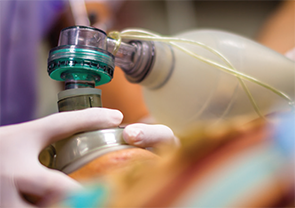Dr. Daniero’s clinic runs a mock airway emergency every six months to identify any process, equipment, or medication issues that could complicate a true emergency. “Clarification of specific roles may be the most important part of handling an emergency situation and can begin during this mock critical event,” he said.
Explore This Issue
August 2015A signal that alerts the clinic of an emergency, either in each room or at the nursing station, is beneficial. “This allows the clinician to call for help rapidly, without leaving the patient,” Dr. Daniero said.
The bottom line is to keep in mind that although adverse events are rare when performing certain surgical procedures in an otolaryngology office, a surgeon and his or her staff need to be prepared for any event that could occur. Assess a patient’s surgical risk, and be sure to have the proper equipment and protocols in place for any emergency that might occur.
Karen Appold is a freelance medical writer based in Pennsylvania.
 Crash cart with emergency medications, including epinephrine, diphenhydramine, and steroids
Crash cart with emergency medications, including epinephrine, diphenhydramine, and steroids